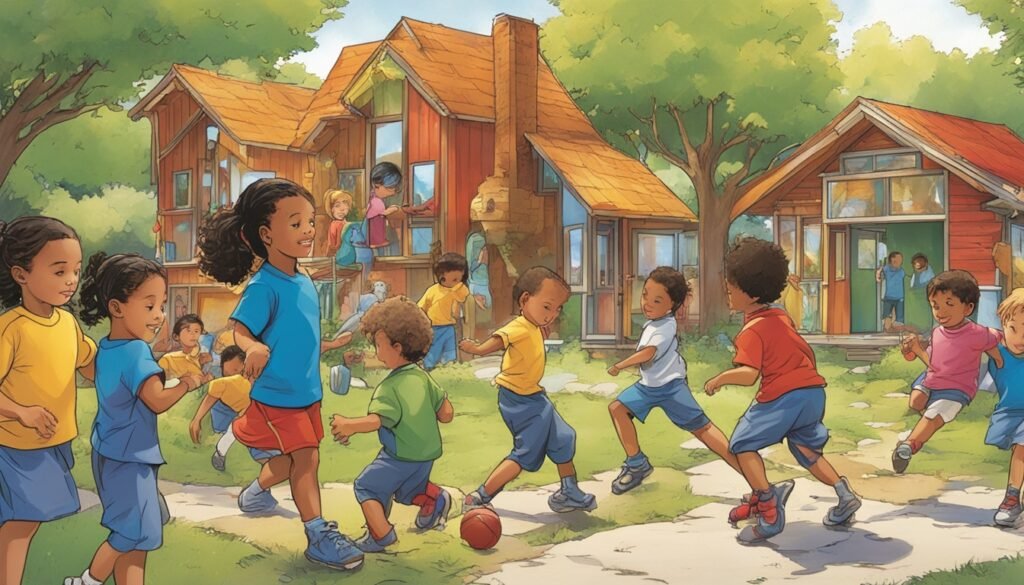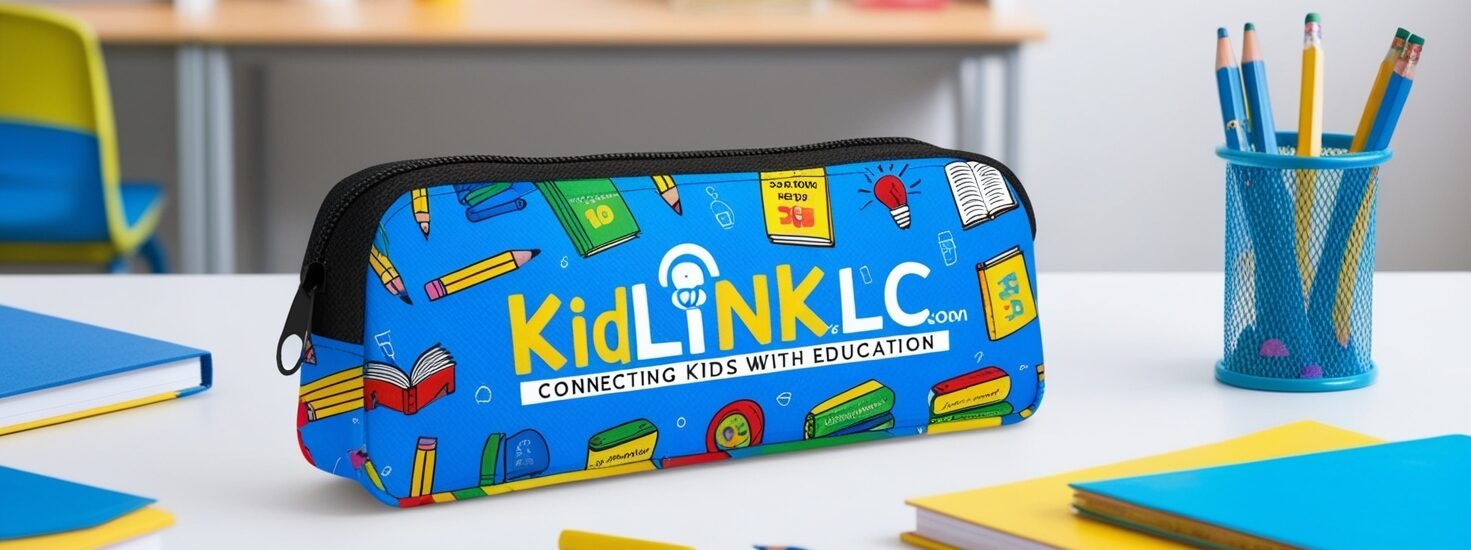How Can Parents Balance Academic Pressure and Extracurricular Activities for a Healthy Childhood?
In today’s fast-paced world, making sure your child has a fulfilling childhood is key. It’s important to balance their school work with fun activities outside of class. With more competition for college spots, parents often feel the pressure to push their kids hard in both areas.
Finding the right balance between school stress and extra activities is crucial for your child’s well-being. It helps keep their school and personal life in harmony.
Knowing how to manage these demands is important for your child’s happiness and growth. At KidLinkLC.com, we believe in giving kids top-notch education and fun resources. This way, they can do well in school and still enjoy being kids.
Key Takeaways
- Balancing academics and extracurriculars is vital for healthy childhood development.
- Academic pressure can lead to stress if not managed well.
- Extracurricular activities enhance creativity and social skills.
- Maintaining a structured schedule can help balance both aspects.
- Involving children in decision-making fosters independence.
- Recognizing signs of overscheduling can prevent burnout.
Understanding the Importance of Balance
Getting a good balance in student life is key for personal and academic growth. In today’s competitive school world, knowing how to mix school work with extra activities helps students do well in school and grow fully.
The Role of Academics in Childhood Development
Academics are the base of knowledge kids need for the future. They teach kids how to think critically and solve problems, which is important for life. By focusing on school work, kids get ready for college and learn to make good choices later on.
The Value of Extracurricular Activities
Extra activities are important for kids because they let them explore themselves, be creative, and make friends. Being in clubs, sports, or arts helps kids grow in ways just as important as doing well in school. These activities boost their confidence, self-worth, and ability to bounce back, making them well-rounded.
Schools look for students who are well-rounded because they know both school work and extra activities are key to a full life. Finding the right balance helps you, as a parent, help your kids become smart, capable, and confident people.
| Aspect | Importance |
|---|---|
| Academics | Foundation for knowledge; prepares for higher education. |
| Extracurricular Activities | Fosters creativity, social skills, and self-esteem. |
| Student Life Balance | Ensures holistic development for academic success. |
Factors Contributing to Academic Pressure
Understanding why students feel so stressed is key to helping them. Many things add to the stress of school life, affecting students and their families. Knowing these factors can help you support students better in managing their work and priorities.
Changing Educational Standards
Education has changed a lot, making students face higher expectations. Schools push for good grades and focus on tests, making students feel swamped. This can make learning hard, as students worry more about scores than understanding.
It’s important to find ways to reduce stress, helping students find a better balance in their lives.
The Competition for College Admissions
Getting into college is tougher, making students push hard to do well in all areas. They’re not just judged on grades but also on extracurriculars. Parents urge their kids to join many activities, worried it could hurt their future chances.
This drive can lead to burnout, showing why it’s key to manage work and focus well. Dealing with these issues can lessen the harm of school stress on students’ health. A study shows how important it is to address this stress to protect students’ well-being. For more info, check out the study here.

Why Balance Academic Pressure and Extracurricular Activities is Crucial
Finding the right balance between school work and extra activities is key for students’ happiness. This balance helps students do well in school and enjoy their childhood more. Let’s look at why this balance is so important.
Promoting Holistic Development
Getting a good balance in education is key for growing well-rounded kids. Being part of different activities helps kids learn important skills like teamwork and leadership. These skills help them grow in many ways.
Extra activities also add to school learning by offering chances for social interaction and personal expression. This helps kids learn life skills that matter outside of school.
Ensuring Emotional Well-Being
It’s also vital to balance school work with fun activities for emotional health. Too much school work can make kids stressed and anxious. But, when kids join in on fun activities, they can relax and build strong friendships.
This helps kids deal with challenges better and feel like they belong in their community. Feeling like they belong is key for their mental health as they get older.
| Aspects | Academic Focus | Extracurricular Activities |
|---|---|---|
| Skill Development | Critical thinking, subject-specific knowledge | Teamwork, leadership, creativity |
| Emotional Impact | Stress, anxiety | Relaxation, social joy |
| Social Interaction | Limited to classroom | Expansive; builds friendships |
| Overall Growth | Focused on grades and exams | Encourages a well-rounded life |
Recognizing Signs of Overscheduling
It’s key to spot overscheduling in kids to keep them mentally and emotionally healthy. Kids with too many activities might show stress and anxiety signs. Catching these early helps in managing stress and keeping the family well.
Stress and Anxiety Indicators
Look out for these signs of academic stress:
- Frequent complaints of headaches or stomachaches
- Changes in sleep patterns or appetite
- Increased irritability or mood swings
- Declining interest in previously enjoyed hobbies
- Difficulty concentrating on schoolwork or activities
If you see these signs, it’s time to check your child’s schedule. Mixing school tasks with hobbies can help lower stress.
Impact on Family Dynamics
Overscheduled kids not only feel the stress but can also change family life. A tense home can lead to less quality time and more arguments. Spotting overscheduling early helps fix these issues fast. It’s important to talk openly about everyone’s workload and hobbies.
Learn more about handling commitments and the effects of overscheduling here.

Creating a Structured Schedule for Students
Having a structured schedule helps students handle school and extra activities better. It gives them a clear plan to follow. This way, they can use their time wisely.
Using Visual Tools for Organization
Visual tools are key for managing time well. Calendars and planners help students see what they need to do every day and week. Adding time-blocking apps helps organize tasks even more.
These tools let students see their whole schedule easily. It’s easier to keep track of deadlines and meetings this way.
Setting Priorities for Different Activities
Knowing what to do first is vital for students. They should pick tasks that matter most to them and their studies. Making a list of priorities helps them focus on important work.
This way, students can handle their tasks well without getting too stressed. They have enough time for school work and fun activities.
Focusing on Quality Over Quantity
Choosing quality activities for your child can greatly improve their well-being. Encouraging them to take part in fewer, deeper activities helps them learn more. This way, they can really get into what they’re doing.
This approach often leads to better skills and happiness. It makes their experiences more valuable, which can help when applying to college.
Choosing Meaningful Activities
Going for quality over quantity can prevent your child from getting too busy. When they dive deep into activities they love, they learn a lot. They become better at balancing school work and hobbies.
This balance is key to doing well in school and personal projects. It shows the importance of focusing on what really matters.
- Encourage exploration of interests and passions.
- Support commitments that enhance personal growth.
- Emphasize the importance of deep involvement over superficial participation.
Help your child make smart choices about their activities. You can find tips on balancing school and hobbies in this comprehensive guide. Make sure they know what they can handle to avoid getting too stressed.

By supporting quality activities and a love for meaningful experiences, you help your child succeed. They’ll learn to manage their time well, leading to a balanced and fulfilling life. This is key to helping them through school and extra activities.
| Quality Activities | Benefits | Impact on Academics |
|---|---|---|
| Sports | Builds teamwork and discipline | Enhances focus in studies |
| Art | Enhances creativity and self-expression | Improves critical thinking skills |
| Music | Develops patience and dedication | Boosts memory and cognitive abilities |
| Volunteering | Instills empathy and social responsibility | Encourages academic perseverance |
By focusing on quality, you help your child grow personally. They’ll get better at managing their time between school and hobbies. This creates a supportive environment for them to succeed.
Encouraging Self-Directed and Free Play
Creating a space for unstructured playtime boosts a child’s growth. This kind of play lets kids explore, be independent, and use their imagination. It helps them find what they like and what they’re good at, which is key for their development.
Benefits of Unstructured Playtime
Unstructured playtime has many benefits for kids. It helps them:
- Explore and feel more confident about their world.
- Make friends and work together, improving teamwork and talking skills.
- Make choices on their own, without needing an adult’s say-so.
- Get better at moving and coordinating their bodies.
Promoting Creativity and Problem-Solving Skills
Unstructured playtime is great for sparking creativity. Kids can try new things and come up with their own ideas without rules. This lets them:
- Find creative ways to solve problems, which sharpens their thinking.
- Express themselves through art, like drawing or building.
- Manage their time and interests well.
Promoting Effective Time Management for Students
Effective time management is key for students to handle schoolwork and activities. By using the right strategies, you can improve how you manage your school tasks and activities. This leads to better student success. Let’s look at some tips that can help you balance your time.
Strategies for Balancing Schoolwork and Activities
Start by looking at what you need to do and what’s most important. Figure out what needs your attention first and set aside time for it. Having a routine that includes homework, study time, and activities can help avoid feeling overwhelmed. Using effective time management tips can guide you in keeping a good balance.
Using Planners and Technology
Using digital tools like planners and apps can make organizing easier. Many apps have features to help students see their tasks and deadlines. For example, reminders and timelines can make sure you don’t miss anything. This helps you work independently and manage your tasks better.

| Time Management Techniques | Description | Benefits |
|---|---|---|
| Weekly Planner | A visual overview of tasks scheduled by the week. | Enhances organization and prioritization. |
| Digital Apps | Tools that provide reminders and to-do lists. | Improves accountability and productivity. |
| Study Techniques | Methods like Pomodoro for focused study sessions. | Increases concentration and reduces procrastination. |
By using these time management tips, you can find a good balance between school and life. This sets a strong base for success in the future.
Involving Children in Decision-Making
Getting kids involved in child decision-making makes them feel more in charge of their lives. When they help decide what to do, they learn to be responsible and understand what they like. Parents can help by letting kids try out different activities that match their interests.
Understanding Their Interests and Passions
Knowing what your child is interested in helps them make better choices. This lets them talk about what they want for school and after school. Encourage them to think about what really gets them excited.
This way, they focus on things they love, making life more rewarding. Being part of the decision-making process helps kids get into activities they enjoy. It also helps them manage their time better between school and hobbies. Talking about different clubs or activities can help them make smart choices.
Studies show that kids who join in these activities do better in school. They attend more and do well academically. This shows how being involved and managing time well can lead to success. You can learn more about how being active in school helps kids do better in this useful resource.
Adjusting Activities as Children Grow Older
As kids move through different life stages, their interests and duties change. It’s key to be flexible with their schedules. Talking often with your child about their commitments helps keep them happy and supports their balance in school and activities.
Flexibility in Scheduling
It’s vital to put school and activities first when adjusting schedules. Being flexible lets you make changes for school needs and personal interests. Talk openly to find out what your child likes, making sure they stay involved but not too stressed.
Here are some tips for being flexible:
- Check in with your child regularly to see if they’re feeling stressed.
- Ask your child what activities they like best.
- Let them help decide on their commitments.
Being proactive helps create a balance that supports both school success and personal growth. Check out this resource for more tips on managing school and activities.

Support Systems: The Role of Parents
Creating a strong support system is key to helping your child handle their duties well. Parents are crucial in keeping kids motivated amidst school stress and other activities. By talking openly and offering emotional support, you help them grow into independent thinkers.
Encouragement and Motivation at Home
A supportive home environment can really help your child balance their many commitments. Encourage them to share their feelings about their schedules and goals. This helps them speak up for their needs and take ownership of their choices.
Parents should talk with their kids about planning for managing responsibilities together. This teamwork helps find the best balance.
Regular family chats about daily tasks can boost motivation. Show your child how to set realistic goals and celebrate their wins, big or small. This shows them that a balanced life is fulfilling.

Keep an eye on your child’s emotional well-being as they deal with school and activities. Talk about their stress and help them find ways to cope. Home support helps them build resilience and confidence.
You are key in teaching these values, helping your child do well in school and life. By focusing on support from parents, you set your child up for success and happiness.
Consulting Educational Professionals
When you’re dealing with school stress, getting help from experts can be a big help. School counselors and educational consultants know how to manage your school work. They can help you balance school tasks with other activities you enjoy.
The Benefits of Expert Guidance
Talking to educational pros has many perks for parents and students. They know how to manage your school work in ways that fit you best.
- Personalized Advice: They look at your situation to make a study plan that works.
- Resource Access: They suggest tools and programs to boost your productivity and focus.
- Communication Skills: Experts help parents and kids talk better about school goals.
- Holistic Approaches: They focus on your growth in school and as a person.

| Type of Professional | Key Contributions |
|---|---|
| School Counselors | Provide emotional support and academic advice, helping with stress. |
| Academic Coaches | Teach study skills and time management that fit you. |
| Learning Specialists | Give strategies for students with learning challenges to do better in school. |
Working with educational experts helps you tackle school stress in a planned way. Their advice helps you manage your school work well. It also creates a space where you can succeed in school and grow as a person.
Steps to Mitigate Academic Stress
Managing school pressure can be tough for kids. Using stress relief tips can make it easier for them. Adding relaxation techniques, like mindfulness, is key to keeping their minds healthy.
Incorporating Relaxation and Mindfulness
Mindfulness exercises are great for building emotional strength. They help kids focus on the now, lowering their school-related worries. Here are some ways to help:
- Mindful Breathing: Tell your child to breathe deeply and slowly when they feel stressed. This helps them stay calm and focused.
- Progressive Muscle Relaxation: Show them how to tense and relax different muscle groups. This helps reduce physical stress.
- Meditation: Just a few minutes of meditation each day can improve focus and make them feel better overall.
- Physical Activities: Encourage them to join in sports or dance. These activities are good for their health and help with stress.
Adding these relaxation techniques to their daily routine helps them manage school and personal life better. Regularly practicing these methods helps them feel more peaceful and focused on their school work.

Conclusion
Finding a balance between school and extracurricular activities is key for a healthy childhood. It’s important to create an environment that supports both personal growth and academic success. By focusing on both, your child can learn important life skills and meet their educational goals.
Talking openly with your child is crucial. Let them share their interests to make sure their activities match their passions. This approach leads to better results in school and personal happiness. Throughout this article, we’ve seen how different activities improve well-being, boost grades, and help kids feel they belong.
Supporting your child means understanding the need for balance. Showing the good side of extracurricular activities can inspire them to aim higher and increase their chances of going to college. For more on how these activities help in school, check out this useful resource. By promoting a balanced life, you help your child do well in school and beyond.


























